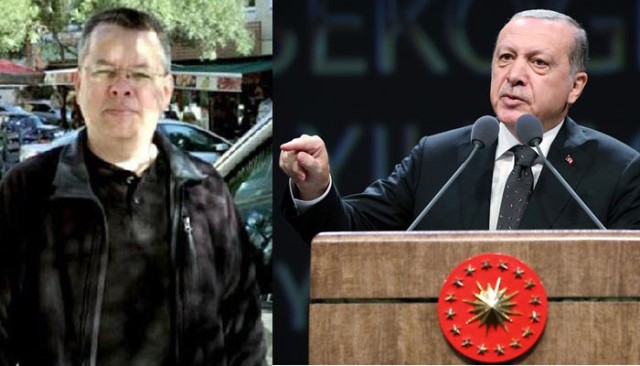A Turkish appeals court refused to release American pastor Andrew Brunson, raising the prospect of further U.S. sanctions targeting President Recep Tayyip Erdogan’s government and renewed market turmoil.
Brunson’s lawyer, Ismail Cem Halavurt, said he’s considering renewing his bid to secure the cleric’s freedom in the wake of the ruling by the appeals court in the coastal city of Izmir. Brunson has been held for almost two years over what Turkey says was his role in a failed 2016 coup.
The decision sets the stage for a new round of sanctions by U.S. President Donald Trump. Treasury Secretary Steven Mnuchin said Thursday the U.S. was ready to announce further sanctions if Erdogan refused the quick release of the pastor. Along with the specter of further punitive actions from Washington, Turkey faces a potential credit-rating downgrade Friday by S&P Global Ratings.
After a rout last week, Turkey’s markets have stabilized following pledges of fiscal discipline by Treasury and Finance Minister Berat Albayrak Thursday and a crackdown by regulators on betting against the currency. Because of a weeklong religious holiday in Turkey that starts Friday night, the lira will be trading on thin volume.
“It still looks like we’re headed to more conflict,” Kathy Jones, chief fixed-income strategist at Charles Schwab Inc. “Neither side seems to be backing down yet.”
The lira weakened 5.3 percent to 6.1455 per dollar at 4:15 p.m. in Istanbul, bringing its decline for the year to around 38 percent.
Market turmoil was triggered when the U.S. stunned its NATO ally earlier this month with sanctions against two Turkish ministers over Brunson’s fate.
Erdogan, who has rejected concerns that Turkey might need a rescue package from the International Monetary Fund (IMF), expanded his diplomatic outreach this week, speaking to leaders of Germany and France and striking a deal with Qatari emir to attract $15 billion.
On Friday, government officials announced a slew of measures to protect the creditworthiness of companies hurt by the weaker lira. The Treasury and Finance Ministry, which originally announced the measures, said they were formulated by Turkey’s banking association TBB and were only recommendations for lenders.
With Turkish companies weighed down by increasingly costly foreign-currency debt, estimated at 40 percent of gross domestic product, and confronting double-digit inflation, the S&P review provides the latest flashpoint.
“The market turmoil in Turkey is the latest in a series of fragilities amplified by gradually tightening financial conditions this year,” according to Wei Li, BlackRock Inc.’s head of iShares EMEA strategy in London. “Investors should prepare for further bouts of volatility ahead.”













